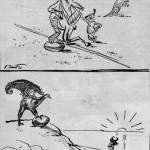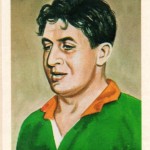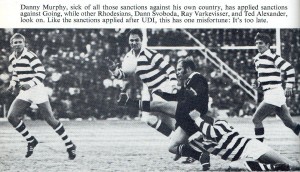McLook
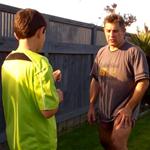 A while back I wrote an article on martial arts in rugby (see here). The focus of that article was more on the tactical side of things; strategic approaches in martial arts which can also be used (and are as a matter of fact) in other sports like rugby.
A while back I wrote an article on martial arts in rugby (see here). The focus of that article was more on the tactical side of things; strategic approaches in martial arts which can also be used (and are as a matter of fact) in other sports like rugby.
An interesting development in New Zealand rugby over the last two years has been the increasing use of martial arts techniques and training methods in rugby. One of my colleagues was heavily involved with the Manawatu Turbos last year playing under Dave Rennie. Rennie of course is now coaching the Chiefs and one can clearly see some of these techniques now being used by the Chiefs. According to my colleague, Rennie has acquired the services of a martial arts expert in Hamilton who is now working with the Chiefs.
 I was pleasantly surprised and much impressed with the Stormers this weekend. The Blues showed just how dangerous they can be against the Bulls last week. They confirmed that for about 10 minutes in the second half when the Stormers got a bit complacent and took the foot of the pedal after establishing a 17 point lead.
I was pleasantly surprised and much impressed with the Stormers this weekend. The Blues showed just how dangerous they can be against the Bulls last week. They confirmed that for about 10 minutes in the second half when the Stormers got a bit complacent and took the foot of the pedal after establishing a 17 point lead.
That sense of complacency as result of feeling secure with their 17 point lead saw the Stormers deviating from their success formula and they paid for it by getting two tries scored against them in seven minutes. Credit to them for rectifying the neglect and going back to the formula.
The Stormers used a well-established formula to beat NZ but added some new dimensions to the pattern. These new strategies employed by the Stormers countered the typical offensive measures NZ sides have been using over the last couple of years to overcome the proven South African recipe to beat them.
 2 August 1956, Solway Ground, Masterton: South Arica 19 / Wairarapa-Bush 8
2 August 1956, Solway Ground, Masterton: South Arica 19 / Wairarapa-Bush 8
It was another disappointing Springbok performance and although they won by 11 points all the tries came from individual effort rather than from smooth team work as one would expect after 7 weeks and 15 matches on tour (excluding the 3 weeks and 6 matches in Australia).
 New Zealand Herald recently published their list of 20 All Black greats.
New Zealand Herald recently published their list of 20 All Black greats.
The List referred to above are the players that made All Black rugby what it is or who changed the direction or perception on how the game should be played in New Zealand.
Who are the Springbok legends that formed SA rugby; who made Springbok rugby what it is? Continue reading
 I have had a look at the Article dealing with whether Heyneke Meyer’s proposed ‘Unified SA Style’ is realistic or not.
I have had a look at the Article dealing with whether Heyneke Meyer’s proposed ‘Unified SA Style’ is realistic or not.
Meyer said on Monday that his ultimate aim would be for all the teams in South Africa to adopt a similar style of rugby.
“In future I would like to install a national style of play and defence and all the attributes that go with it, and everybody should buy in,” Meyer said.
“I am realistic and know you can’t force people to play the same, but there should at least be a common goal and places where you can touch base.”
This brought me to the question is this possible at all and what is the typical South African style? I think what most SA teams have in common is the idea of dominating the set piece (scrum and line-out). Soften them up in the forwards before you spread it to the backs type of philosophy. Continue reading
 28 July 1956 – Rugby Park, Invercargill
28 July 1956 – Rugby Park, Invercargill
South Africa 23 / Southland 12
Southland hospitality was at play when the Springboks arrived in a cold Invercargill. Lavish entertainment including flights to the beauty spots in the South Island was laid out by the Southland Rugby Union.
17 July 1971 – Sydney Oval, Sydney

 South Africa 19 / Australia 11
South Africa 19 / Australia 11
Not much is available about this Test apart from some Gerhard Viviers commentary (see video below) and brief descriptions of the Springbok tries. There were two changes to the South African team who played against France earlier the season at home.
Morné du Plessis and Hannes Viljoen got their first caps in the places of the injured Tommy Bedford and Gert Muller. The South African team can be seen in the table below.
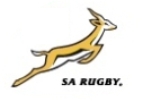 South Africa 27 /West Coast-Buller 6
South Africa 27 /West Coast-Buller 6
Dominating in the scrums and line-outs has so far proven to be not enough for the 1956 Springbok team. Not even halfway thought the tour yet and they’ve already lost two tour matches namely against Waikato and Canterbury as well as the first test in spite of winning the line-out and scrums contests in each of these matches.
The two main problems seem to have been; firstly, an inability to contest at the rucks/tackle ball; secondly, lack of polish in the backline. The lack of structure at the rucks and collision areas has been the main area targeted by the local team’s right from the Waikato match. The primary approach was simply to change the line-outs and scrums into rucks and then to charge through in numbers and/or to put the ball behind the Springboks with box kicks and then charge at the backs.
Canterbury 9 / South Africa 6
This match was a turning point in terms of the media and public’s (in both countries) relationship with Craven and the 1956 Springbok team.
Terry McLean writes: This was the day that Canterbury, for the second time in three encounters, defeated South Africa, this was the night that Danie Craven, after telling me that he was not a happy man, said a critical piece about refereeing in New Zealand, this was the week-end in which he made an official complaint about the quality of New Zealand refereeing and this was the succeeding week in which angry passions were stirred in the backrooms of newspaper offices, both South African and New Zealand, that the Grey River Argus felt impelled to say, “Sour grapes, Dr Craven –very sour grapes indeed!”
The 1956 team was not a particularly happy touring group and struggled to find their feet right from the start of the New Zealand leg of the tour after losing the first match against Waikato. The Springboks had a hard time adjusting to the wet playing surfaces, the rainy/muddy conditions, the flat lying and rush-up defensive style of the New Zealand teams but in particularly with the kick and charge/marauding foot rush tactics of the New Zealand teams. The rucks were a nightmare for the Springboks and they were at loss how to counter the locals’ aggression, structure and ascendency at the tackle ball.
The afternoon of the same morning they arrived from South Africa the Springboks played in their first game against a combined team of Western Australia in PERTH.
Charles Blunt the President of Australian rugby formally welcomed every Springbok with a handshake before the first match (see Picture below).
This picture shows Charles Blunt president of Australia rugby being introduced to the players by Hannes Marais before the first match. Here he shakes hands with Dirk de Vos.
From left to right: Robbie Barnard; Piet Visagie; Johan Spies and Joggie Jansen
One of the brightest stints in the history of Springbok rugby was in 1970 and 1971. In 1970 South Africa of course won the 4 test series against Brain Lochore super All Black team at home. The 1971 international season started off with two tests at home against a French touring side. The Springboks won the first one on 12 June 1971 in Bloemfontein 22-9 and drew the second one 8 all on 19 June 1971 in Durban.
 18 July 1956, Fraser Park, Timaru – Springboks 20 / 8 South-Canterbury & North-Otago & Mid-Canterbury Combined
18 July 1956, Fraser Park, Timaru – Springboks 20 / 8 South-Canterbury & North-Otago & Mid-Canterbury Combined
Craven took a week off –resting at Mount Cook- and under instruction of assistant manager Dan de Villiers the Springbok intentions was to run the ball against a team not likely to front any stiff opposition.
A number of factors combined to derail the effort especially in the last quarter of the second half when the match turned into an extremely scrappy affair. These factors being injuries –before and during the match- poor refereeing, and a general sort of holiday or lack of real application attitude amongst the second stringers. Continue reading
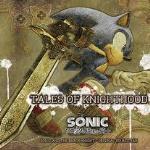 Richie McCaw has turned down a knighthood and Steve Hansen has been appointed new All Black coach.
Richie McCaw has turned down a knighthood and Steve Hansen has been appointed new All Black coach.
The New Zealand Prime Minister told Radio Sport he sounded out the All Black Captain on getting a knighthood.
He says he was deadly serious about the offer for the New Year’s honours.
14 July 1956 – Carisbrook, Dunedin: All Blacks 10 / Springboks 6
Test matches are won by taking your changes. The prevailing thought after this test match was that New Zealand deserved to win mostly because they took their chances while South Africa made it easy for them by employing the wrong game tactics, with poor decision making on attack and annoying ball handling errors. Reg Sweet writes in his book ‘Springbok and Silverfern’: “New Zealand had three chances throughout the match. New Zealand took them, and so New Zealand won. It was as straight forward as that.”
The Springbok forwards surprised everyone and were without a doubt the better team in the scrum pushing the All Blacks on repeated occasion’s meters back in the scrum. New Zealand worked out some strategies to counter Claassen in the lineout as the game progressed -making it a bit more of an even contest in the latter stages of the match- but South Africa still won the lineout contest comprehensively 28-35. South Africa won the scrum count 12-21. Reg Sweet wrote: “New Zealand’s pack, astonishing sight, was attempting to heel at times while obviously on the back pedal.”
This Article is a bit out of sequence with the rest of the Atricles on the 1956 Springbok tour. I recently got some more information on the 1956 tour, especially about the Australian leg of the tour. I also needed an Article on the arrival in New Zealand for my web site so I decided to add this information. By the end of this week I will write an Article on the first test of the 1956 series including some video clips.
After a smooth flight of five hours across the Tasman, the Springboks arrived in New Zealand on the evening of Tuesday 5 June. Warwick Roger narrates the arrival as follows in his book ‘Old Heroes’:
7 July 1956 – Carisbrook, Dunedin
South Africa 14 / Otago 9
Dunedin and Otago has to some extend been to New Zealand rugby what Stellenbosch and Western Province rugby were to South African rugby. Both University cities that lost their respective roles as gateways to the respective national sides due to the professional era and neither Stellenbosch nor Dunedin is today the rugby powerhouses or talent accumulators if not developers it used to be.
South Africa 41 / Nelson Combined 3
The 1956 Springboks had two matches left to start playing as a team before the first test, it was not about notching up results anymore it was time for the forwards to start playing as a pack and for the backline to show some polish.
South Africa 22 / Hawkes Bay 8
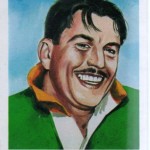 This match was played in the looming shadow of the first test on the back of mounting concern about the Springboks inability to hit form and constant worries about injuries to players.
This match was played in the looming shadow of the first test on the back of mounting concern about the Springboks inability to hit form and constant worries about injuries to players.
As a consequence different players and combinations were selected in the key positions in literally every match so far on tour.
 Springboks 22 / Poverty Bay-East Coast Combined 0
Springboks 22 / Poverty Bay-East Coast Combined 0
The Springboks travelled by plane -for the first time on tour- from Wellington to Gisborne to play a combined Poverty Bay-East Coach team.
Gisborne was a lovely town (now a city) nestling amid the hills and woods which fringe Poverty Bay, where Captain Cook made his first landing in Aotearoa. Continue reading
 Ian Jones made an interesting remark the other night on TV during pre-match run-up to the RWC final. The panel were debating Graham Henry’s tenure as All Black coach and what makes him so successful. Jake White over emphasized –for understandable reasons- the fact that NZRU stuck with Henry and gave him another change, which brought that experience of having been there and knowing what it’s all about into the team environment. Jake has a good point to which I’ll return a little later in my dialogue, but Ian Jones took a different angle.
Ian Jones made an interesting remark the other night on TV during pre-match run-up to the RWC final. The panel were debating Graham Henry’s tenure as All Black coach and what makes him so successful. Jake White over emphasized –for understandable reasons- the fact that NZRU stuck with Henry and gave him another change, which brought that experience of having been there and knowing what it’s all about into the team environment. Jake has a good point to which I’ll return a little later in my dialogue, but Ian Jones took a different angle.
 The concept of the X-factor actually comes from racehorses, specifically from a horse called Eclipse. An extremely large heart is a trait that occasionally occurs in Thoroughbreds, linked to a genetic condition passed down via the dam line, known as the “x-factor”.
The concept of the X-factor actually comes from racehorses, specifically from a horse called Eclipse. An extremely large heart is a trait that occasionally occurs in Thoroughbreds, linked to a genetic condition passed down via the dam line, known as the “x-factor”.
Eclipse, the horse, was necropsied after his death in 1789. Because Eclipse’s heart appeared to be much larger than other horses, it was weighed, and found to be 14 pounds (6.4 kg), almost twice the normal weight. Eclipse is believed to have passed the trait on via his daughters, and pedigree research verified that arguably the best racehorse ever, namely Secretariat can trace in his dam line to a daughter of Eclipse.
In the 20th century, the heart of Phar Lap was weighed and also documented to be 6.35 kilograms (14.0 lb), or essentially the same size as that of Eclipse.
Now you might ask what this has got to do with the All Blacks and the Rugby World Cup final.
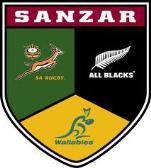 I still just can’t get over that quarter final loss.
I still just can’t get over that quarter final loss.
The more I think about it the more I feel we were robbed. Yes, the referee was bad and wrong and yes we contributed to our demise with how we approached the game and by the appointment of a puppet as Springbok coach 4 years ago. However, all of that (poor referee, game plan, coach selection) and the Pool construction process at this year’s Rugby World Cup is part of an insidious virus, in my opinion, which is destroying Rugby Union as we know it. It is this virus which orchestrated our demise in the Rugby World Cup quarter final match against Australia.
No matter the outcome of tonight’s semi-final match and who eventually win this tournament this 2011 RWC will be remembered as the mother of all referee muck-ups.
If Australia and France where to play in the final I won’t even watch it because neither of those two teams deserve to be there. Roll that into a zoll Paddy O’Brien and smoke it.
A New Zealand victory over Aussie would ensure a pretty one-sided final which should see the All Blacks running away with it.
 As a general rule I watch the rugby not the referee.
As a general rule I watch the rugby not the referee.
This of course doesn’t mean that I don’t shout at the referee (even in front of the TV knowing pretty well that he can’t hear me) when he makes mistakes. I can see when the referee has a bad game and of course I get upset but I am, as a spectator, more interested in how we play; what do we do with the ball; our structures and systems at the tackle ball; our game tactics; what is the script we are following; our defensive patterns; are we showing improvement on previous games in areas we didn’t do well; how is our scrum going; are we using starter moves; running angles of the backline; how well is No10 dictating the match and where does he take up position behind the scrums, at rucks and line-outs and so forth.
A consequence of all that is that I tend to reflect more on why didn’t we get things right or what went wrong and what can we improve on, independent of whether we lose or win after the match. Continue reading
 Halfway through a frustrating night -during which I slept little due to the massive disappointment of SA dropping out of the 2011 RWC- I started to see some reasons why the Springboks lost.
Halfway through a frustrating night -during which I slept little due to the massive disappointment of SA dropping out of the 2011 RWC- I started to see some reasons why the Springboks lost.
The thing that kept me awake most was the fact that the Springboks had 76% of the ball, dominated scrums and line-outs (Matfield taking 6 of their line-out balls), had territorial advantage for most of the match and had the Wallabies under massive pressure for almost the entire match and still lost the game.
Here are the 13 reasons I came up during my night of suffering. Continue reading
 Jeremy Paul the ex-Aussie hooker made an interesting comment after the NZ / Canada game namely that on the evidence of the Canada game NZ would not be able to win the RWC.
Jeremy Paul the ex-Aussie hooker made an interesting comment after the NZ / Canada game namely that on the evidence of the Canada game NZ would not be able to win the RWC.
Weepu was not convincing on 10 neither was Slade. The rest of the NZ game was, in my, appreciation pretty good. They lost some form in the second half -which is understandable considering the scoreboard at that stage- but the big concern according to Jeremy Paul is the fact that the NZ halfbacks will have less time and space (than against Canada) when playing against quality opposition.
Paul obviously has the NZ/Aus Brisbane game in mind where the Wallabies secured a win by cutting down the space of the NZ halfbacks. Continue reading
 Don’t you just hate it when the Springboks go into their infuriating defensive mode of play?
Don’t you just hate it when the Springboks go into their infuriating defensive mode of play?
Truth is the Springboks were never really at risk of losing the game and it was almost like a big boy holding a little kid at arms length while the little guy punches himself to a stand still.
The last couple of days required extreme patience from South Africans here in New Zealand. It took quite some maturity to stay relaxed and calm in the face of the overbearing arrogance and confidence exhibited by the Samoan supporters here in New Zealand.
Listening to them you would have thought they are the world champions and a team who have beaten every other rugby nation/team on the continent (as oppossed to the Springboks who have actually done it) so assured where they that they were going to win the match. The pre-match gamesmanship like having a team talk before doing their Haka just an example of an overbearing cocksureness that really should be the privilage of competitors that have done the hard yards and who have the track record and ability to utilze such tactics too gain advantage. If primary school kids pulls such antics against high school kids it is out of place and utterly useless becuase it will make no difference whatsoever to the outcome of the match.
Mark Reason the man who wrote the article about the All Blacks cheating at the break down came out with another controversial statement yesterday.
Essentially he is expressing dissatisfaction with the make-up of the England rugby team. Indicating that it’s full of hired-guns and that the rules have been bent since the advent of professionalism to allow players from one country to play test rugby in another country.
Being a New Zealand citizen (although originally from England) he is probably the last one to talk considering the history of New Zealand utilizing South Pacific Island players like Frank Bunce, Bryan Williams, Jono Lomu and so forth.
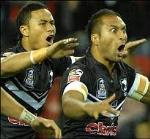 Peter de Villiers surely did put the attention back on the Haka with his remark that over-performing it will impact on its effect.
Peter de Villiers surely did put the attention back on the Haka with his remark that over-performing it will impact on its effect.
The other side of the coin is that the more it is performed in the streets the more it connects the people to the tribe/nation.
I often get the impression that New Zealanders –especially the Islanders- have difficulty understanding that the rest of the world just don’t have the same romantic obsession with the Haka than them.
As an outsider one can feel that they just don’t get it namely that outsiders tolerate it and are not in awe of it. That outsiders are being polite and not overwhelmed by it when they make compliments and positive remarks about it.
For outsiders it is hard to understand how the Haka connects the individual to the Soul of the nation. For the kiwis the Haka is a serious war dance.
I know it is RWC time and I have written before (read here) about the fairy tale Curry Cup win of Griqualand West against the mighty Blue Bulls in 1970. This week I received this wonderfully written account by Michael Kokkinn about that historic match. Micheal’s father was not only one of the selectors of the Griquas team but also a sort of mentor to coach Ian Kirkpatrick. Michael actually attended the match in 1970 and here is his first hand personal recollection of the match.
My personal thanks to Michael for this personal first hand and historical recollection of that match. You can feel the passion for the game as you read his story. This is heartland South African rugby and it is people like him that make South African rugby what it is.
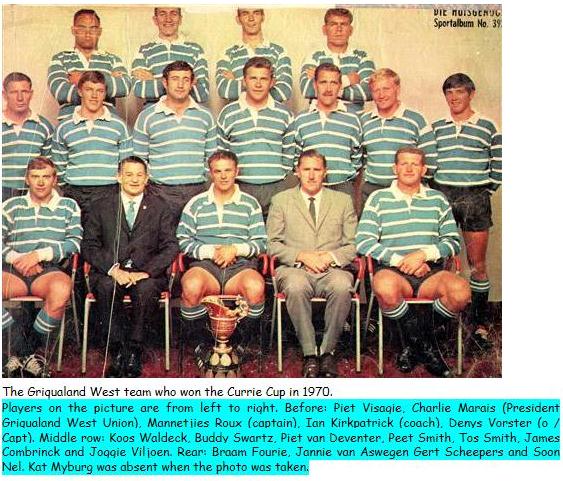
1970 Griquas Team - Currie Cup winners

 Well this was much better. The Springboks were innovative and clearly made some adjustments to how they play the game. Probably because of the change in game plan, most of the players played well. A few played exceptionally well like Frans Steyn, Danie Rossouw, Schalk Burger, Heinrich Brussow, Gurthro Steenkamp and Bismarck du Plessis, when he came on.
Well this was much better. The Springboks were innovative and clearly made some adjustments to how they play the game. Probably because of the change in game plan, most of the players played well. A few played exceptionally well like Frans Steyn, Danie Rossouw, Schalk Burger, Heinrich Brussow, Gurthro Steenkamp and Bismarck du Plessis, when he came on.
Danie ‘Pakslae’ Rossouw was outstanding in everything he did and maintained a high work rate on defence and on attack. Out wide he showed some deft touches, good decision making and a surprising turn of speed.
The most pleasing aspect of the whole match was the fact that they kept the ball in hand.
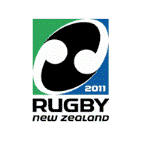 I’ve found myself pondering more and more about the amount of injuries during this year’s RWC. Is it just my imagination or are there more injuries this year than previous times?
I’ve found myself pondering more and more about the amount of injuries during this year’s RWC. Is it just my imagination or are there more injuries this year than previous times?
In run-up to this year’s RWC we had constant injuries to Springbok and All Black players to the extent that everyone was starting to label it as ‘resting’ or ‘cotton wool’ procedures.
South Africa have players like Bekker, Vermeulen, Potgieter, Juan Smit (to name but the few I can now remember) who was not even considered for the RWC squad due to injury.
At the moment Matfield, Bakkies Botha, Jean de Villiers, Johan Muller, Flip van der Merwe, and Habana are all injured. In the All Black camp McCaw, Carter, Dagg and Mills Muliaina are all injured and can’t play on the weekend. Continue reading
This Article should actually be read in conjunction with the previous one, namely “Analysis of the Springbok / Wales match”. A lot of the things that I wrote about in the first Article can actually be seen on these video clips.
Frans Steyn scored for South Africa within the first 3 minutes of this historic match between SA and Wales in the second Pool D (so-called pool of death) match of the 2011 tournament.
